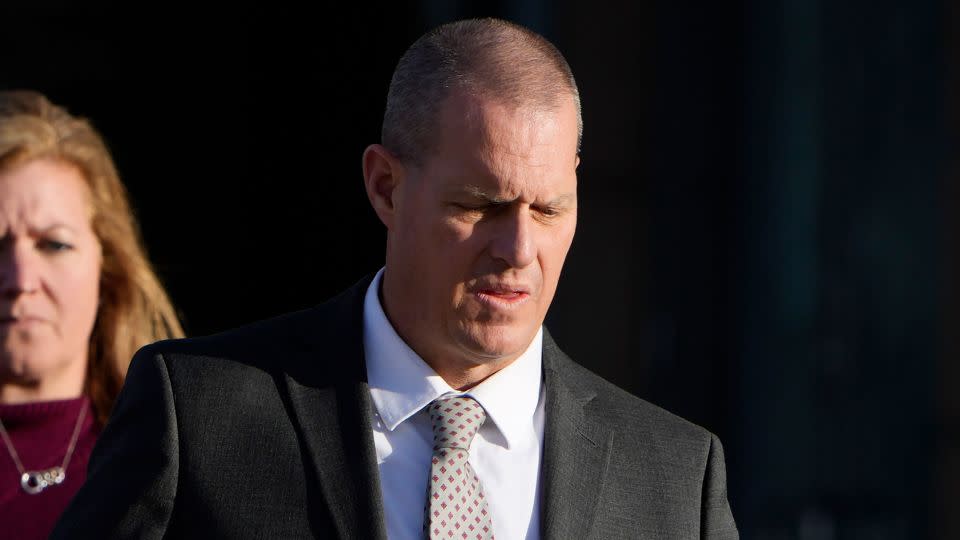Paramedic convicted in Elijah McClain’s death sentenced to 5 years in prison

One of the two paramedics convicted of criminally negligent homicide in the 2019 death of Elijah McClain, the 23-year-old Black man detained by police and injected with ketamine, was sentenced Friday in a Colorado courtroom to five years in prison, the minimum.
Peter Cichuniec was found guilty of criminally negligent homicide and second-degree assault in December. His co-defendant, Jeremy Cooper, also was convicted of criminally negligent homicide and is scheduled to be sentenced April 26.
Before sentencing, Cichuniec said in court that he was “very sorry that Elijah is no longer with us, and I mean that from the bottom of my heart.”
“Miss McClain tragically lost a son and we, also, a patient, and I don’t take that lightly,” he said.
McClain’s mother, Sheneen, called Cichuniec’s sentencing the “bare minimum.”
“They had an opportunity to save him,” she told CNN affiliate KUSA after the sentencing. “He was speaking, he was talking when they got there.”
“I can’t even imagine what Elijah experienced,” she said through tears. “I’m just glad this part is over.”
The criminal trial against the two paramedics was unparalleled, CNN previously reported. Paramedics are typically considered local government agents protected by statutory immunities where injury and death can occur even when they abide by their medical training.
Colorado Attorney General Phil Weiser in a statement said the sentence “sends a strong message that no profession, whether a paramedic, a nurse, a police officer, an elected official, or a CEO should be immune from criminal prosecution for actions that violate the law and harm people.”
CNN has reached out to the defense for comment.
Cichuniec cried in court while his wife and his two sons pleaded with the judge to impose the minimum sentence.
The paramedic told the judge he was “begging for the mercy from the court to allow me the opportunity to be able to provide for and be with my family.”
“I know this won’t sound fair because Miss McClain will never have an opportunity with Elijah, but I beg of you on this sentencing day that you give me the opportunity, judge … to return to my family, to provide for them,” he pleaded.
McClain’s mother also spoke ahead of the sentencing, describing her “righteous anger towards those who made sure my son did not see another day” and calling for justice for her son.
Adams County Judge Mark Warner noted Cichuniec was the highest-ranking paramedic on the scene and that there was an “ill-defined transfer of command” between the different first responders present.
“It is impossible to unremember the video and images of Elijah McClain’s suffering in the last minutes of his young life,” Warner said during the sentencing.
The charges stemmed from the arrest of McClain in Aurora on August 24, 2019, when police officers responded to a call about a “suspicious person” wearing a ski mask, according to the indictment. The officers confronted McClain, a massage therapist, musician and animal lover, who was walking home from a convenience store carrying a plastic bag with iced tea.
In a disturbing interaction captured on body-camera footage, police wrestled McClain to the ground and placed him in a carotid hold, cutting off the blood flow to his brain and rendering him unconscious. Paramedics were called to the scene and injected McClain with a dose of the powerful sedative ketamine appropriate for a 200-pound person, even though he weighed just 143 pounds. He suffered a heart attack on the way to a hospital and was pronounced dead three days later.
During the trial, both paramedics admitted to administering a large amount of ketamine to McClain based on an inaccurate overestimation of McClain’s weight. Additionally, Cichuniec told prosecutors during the trial he made the decision to administer the 500-milligram dosage without asking McClain for his height or weight because he was experiencing “excited delirium,” a controversial diagnosis primarily used to describe violent agitation from people being detained or restrained by police. The diagnosis is not recognized by major medical associations, including the American Medical Association.
Dr. Roger Mitchell, a forensic pathologist who reviewed the body camera footage from the incident, testified that McClain showed “no evidence of excited delirium” in the videos but did show signs of oxygen deficiency.
Prosecutors initially declined to bring charges, but the case received renewed scrutiny following the nationwide Black Lives Matter protests in spring 2020. Colorado Gov. Jared Polis appointed a special prosecutor to reexamine the case, and in 2021 a grand jury indicted the two paramedics and three Aurora police officers who detained McClain.
Ex-officer Randy Roedema was found guilty of criminally negligent homicide and assault, and he was sentenced to 14 months in jail and four years of probation. Jason Rosenblatt and Nathan Woodyard were acquitted of all charges.
At the paramedics’ trial, prosecutors argued the two acted recklessly in administering a large dose of ketamine to McClain despite not speaking with him or checking his vital signs.
“This is reckless … It’s intending to cause pain – bodily injury and stupor,” Senior Assistant Attorney General Jason Slothouber said. “It’s not intending to kill, but it is wildly, insanely reckless. It’s the medical equivalent of putting on a blindfold, jumping in a car and hitting the gas as hard as you can.”
In response, both paramedics testified they believed McClain was experiencing excited delirium and said their treatment protocol was to administer a ketamine dose they believed was safe.
CNN’s Jeremy Harlan, Cheri Mossburg, Raja Razek, Sarah Davis, and Zoe Sottile contributed to this report.
For more CNN news and newsletters create an account at CNN.com

